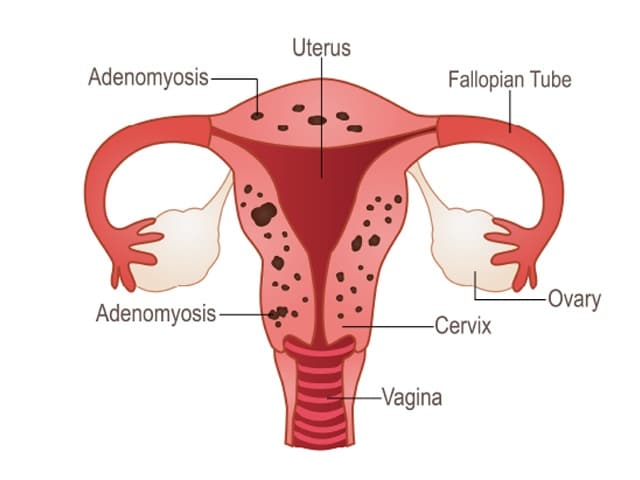
Adenomyosis is defined as ‘the presence of endometrial glands and stroma found within the muscle of the uterus or myometrium. During monthly menstruation, this embedded tissue bleeds and can lead to intense pelvic pain, inflammation and swelling, and heavy bleeding.
This condition is oftentimes misunderstood or even misdiagnosed, as Adenomyosis, often referred to as Endometriosis of the muscle of uterus, causes both painful and heavy periods, painful sex, or dyspareunia.
With Endometriosis, spots of endometrial lining are located outside of the uterus, while in the case of Adenomyosis, this tissue is inside the muscle of the uterus… or an “Inside-Out Endometriosis”, as it used to be known.
To date, there are no clear causes of Adenomyosis, which can be frustrating. Studies have shown that people who have given multiple births and who already suffer from Endometriosis are more at risk for Adenomyosis.
To diagnose Adenomyosis, a doctor will examine you and assess your symptoms. With this condition, the uterus may feel big, soft, tender, and very sensitive to the touch.
Tests that can be performed by your doctor are:
- Ultrasound
- MRI
- Pathology examination after a Hysterectomy procedure
As far as treatment goes, the symptoms of Adenomyosis can be dealt with by taking pain medication or by preventing monthly menstruation with hormonal treatment:
- Pain medication: The pain associated with Adenomyosis can be debilitating. Analgesics, anti-inflammatories, or strong painkillers can be prescribed.
- Hormonal Treatment: This is not a cure, as the pain will return if the treatment is stopped. Oral contraceptive pills and contraceptive implants (hormonal IUD), or injections can be suggested by your doctor to relieve pain and stop monthly periods.
- Surgery: If Adenomyosis is localized, it could be surgically excised. Sometimes the only solution to Adenomyosis is to remove the entire uterus. This procedure is called a Hysterectomy and may be suggested by your doctor based on your medical history, extent of pain, and other symptoms.

